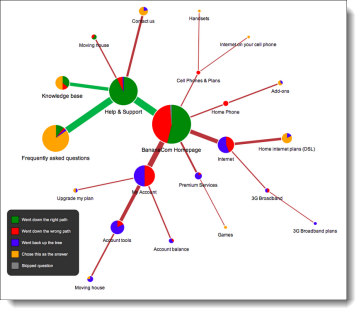Recently, we were asked to assist with a site redesign effort. The site was built by an in-house team as an eLearning portal. The marketing team that owned the site decided that the passage of time and the desire to move it to a vendor learning management system (LMS) provided an opportunity for a redesign.
A common mistake with redesign projects is to start from scratch with
a new site. Instead, we undertook an effort to understand the
strengths and weaknesses of the current state to help inform the
design effort. Our overall goal was to provide recommendations that
would include what to keep (because it worked well) as well as a
prioritized list to change.
In addition, we were challenged by the need to: a) produce results
quickly and b) keep costs low. In order to provide results with
these two concerns in mind, we began with a heuristic or expert
review followed by a reverse card sort using Optimal Workshop’s
Treejack tool. Since a 30-day license with Treejack is only $109
USD, it fits the bill for providing quick low cost feedback.
A heuristic or expert review is a systematic usability inspection
method employed to identify user experience problems. This
evaluation, conducted against a set of design principles known as
heuristics, is performed with an understanding of users and their
work domain. The evaluation is focused on elements that are
inconsistent with an intuitive, usable experience.
A reverse card sort is used when a design is already in place and
problems exist with the current menu structure. Participants are
asked to navigate through a hierarchy of cards or links to locate
where they believe certain items to be.
Typically, we would take the time and cost to recruit study
participants who were either currently using the site or would be
representative of those users our clients were seeking. In order to
keep costs low, we recruited a generic set of Internet users instead
that were recruited via Amazon’s Mechanical Turk. This service
enables anyone to post small projects to a group seeking work. We
were pleasantly surprised that our posting of the reverse card sort
was responded to quickly by participants at a cost of $5 each who
were largely thoughtful individuals. In addition, the participants
gave us great feedback. The turn around time was amazing for two
rounds of ten participants. Each round was completed in less than 24
hours.
When analyzing the data, we were able to use the reverse card sort
findings to illuminate what we uncovered with the expert review.
Both positive and negative findings were reinforced. For example,
the basic tasks of login, password retrieval, and printing a course
certificate were successfully completed during our Treejack
activity; however, participants struggled to register an account
and were tripped up by navigation labels that were not distinct.
In the end, we were able to deliver a comprehensive set of findings
and recommendations to help inform the redesign effort. By
highlighting what worked well with the existing site, we were able to
make recommendations for change without losing what worked well so as
to minimize the jarring effect of a redesign for existing users.
Better yet, we were also able to deliver quickly and at a low cost.
